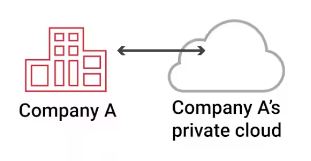Cloud Computing - Private Model
Cloud deployment models describe how cloud computing resources and services are hosted, managed, and made available to users and organizations. It simply refers to delivering computing resources, such as servers, storage, databases, software, and applications, over the Internet.
2. Private Cloud
Private cloud is also known as an internal cloud or corporate cloud. A private cloud is a cloud service that is not shared with any other organization. The private cloud user has the cloud to themselves.
Private cloud provides computing services to a private internal network (within the organization) and selected users instead of the general public.
Private cloud provides a high level of security and privacy to data through firewalls and internal hosting. It also ensures that operational and sensitive data are not accessible to third-party providers.
HP Data Centers, Microsoft, Elastra-private cloud, and Ubuntu are the example of a private cloud.

A Common Private Cloud Example
Private cloud is more like owning a house, where you have your own personal space that belongs to you, but you’re also personally responsible for the overall care and upkeep. However, there are cases where a business may choose a private cloud to fulfill certain requirements, such as industry or region-specific compliance and data sovereignty needs.
How Private Cloud Works?
A single-tenant environment, a private cloud prevents businesses from sharing
their resources with other users or clients. There are numerous ways to host and
manage these materials. The infrastructure and resources already available in
the company's on-site data center may be used to build the Private Cloud in some
cases. If not, new infrastructure can be created independently with the aid of a
third party provider.
But there are some circumstances in which the single-tenant environment is being
tested independently by using virtualization software. However, the private
Cloud and its resources are devoted to a single tenant or user. One of the cloud
deployment models is the private cloud. All three types of clouds - public,
private, and hybrid - share key cloud infrastructure elements.
Advantages of Private Cloud
There are the following advantages of private cloud.
- More Control - The private Cloud offers more control over the resources and hardware than the public Cloud. This is because only authorized users have access.
- Security and Privacy - The main advantage of the Private Cloud is its security and privacy. It consists of improved and additional security levels compared to Public Cloud.
- Improved Performance - Users adopting Private Cloud experience better performance with improved speed and space.
- Customization - Private Cloud offers a complete configuration to the organization. A private cloud is built under the guidance of an experienced on-site cloud architect, which means organizations can specify the exact required environment to run applications. Hosted Private cloud is beneficial, and there is no requirement for on-premises setup. In this scenario, the business and vendor will work together to design and manage the Cloud.
- Hybrid Integration - Sometimes an application requires additional computing resources. In this case, hybridization helps extend the private Cloud resources into a public cloud to maintain uptime without installing additional servers. It can be a cost-effective solution for businesses who require a private Cloud security level and want to function as a public cloud.
Disadvantages of Private Cloud
Private cloud have following disadvantage also.
- High Cost - Private Cloud is costlier than Public Cloud as the setup cost, and maintenance cost are expensive.
- The restricted area of Operations - In a Private Cloud, the operations are finite within an organization, so the functions are finite.
- Limited Scalability - Scaling in Private Cloud can be hosted within the internal resources capacity of an organization.
- Skilled People - Skilled People are significant for an organization to manage and operate cloud services.
- Up-Front Cost - Fully Private Clouds are hosted on-site and require heavy capital. In a Private Cloud, the hardware requirements can be costly, and an expert cloud architect is necessary for setting up, maintaining, and managing the environment.
- Capacity Utilization - Organization is responsible for maximizing the utilization capacity in Private Cloud.
Top Private Cloud Providers
Below is the list of top and leading Private Cloud Providers, and they are as follows:
- Hewlett Packard Enterprise (HPE)
- Cisco
- Microsoft
- VMware
- Dell EMC
- Oracle
- IBM
- Red Hat
Next
